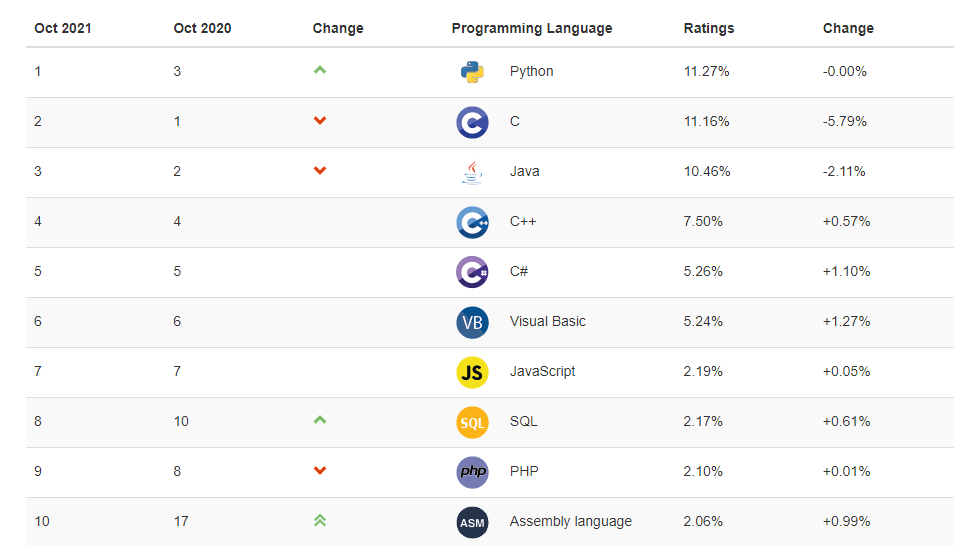Since Linux, since the years the internet was young, the time when the mobile ecosystem began flourishing, Java, C and some others were on top of the hill.
Later, JavaScript caught up as the web matures.
But this time, Python has overtaken them all.
Python was conceived in the late 1980s by Guido van Rossum, at Centrum Wiskunde & Informatica (CWI) in the Netherlands. Since the rise of Artificial Intelligence (AI), cloud computing and big data, developers have been learning Python due to its community support and flexibility.
As a result, the programming language witnesses incredible growth and popularity year by year.
And this time, according to TIOBE Software's updated rankings for October 2021, its index concluded that Python is the most popular of them all.

TIOBE Software, a firm that specialize in assessing and tracking the quality of software, has tracked the popularity of programming languages for the past two decades, using queries on popular search engines and websites to assemble its index.
A total of 25 sources were used.
The index itself is not about the best programming language, and neither is the language in which the most lines of code have been written.
TIOBE's research is strictly about the amount of searches for languages people made on search engines and various of websites.
"The TIOBE Programming Community index is an indicator of the popularity of programming languages. The index is updated once a month. The ratings are based on the number of skilled engineers world-wide, courses and third party vendors. Popular search engines such as Google, Bing, Yahoo!, Wikipedia, Amazon, YouTube and Baidu are used to calculate the ratings. It is important to note that the TIOBE index is not about the best programming language or the language in which most lines of code have been written."
So while the research may not made the final conclusion about the popularity of Python, the methodology can still highlight the important milestone for the programming language, given that it's the first time in 20 years for Python to top TIOBE's rankings.
"For the first time in more than 20 years we have a new leader of the pack: the Python programming language. The long-standing hegemony of Java and C is over. Python, which started as a simple scripting language, as an alternative to Perl, has become mature. Its ease of learning, its huge amount of libraries, and its widespread use in all kinds of domains, has made it the most popular programming language of today. Congratulations Guido van Rossum! Proficiat!" wrote Paul Jansen, CEO of TIOBE.
And in TIOBE's research, Python topping its index happened also because other languages were falling in searches, that an 11.27% share for Python was enough for it to take the lead.
In the list, C fell 5.79% compared to October 2020 for an 11.16% share on the index, while Java fell 2.11% to 10.46%.
Other languages that rounded out the top 10 in the TIOBE's October index were C++, C#, Visual Basic, JavaScript, SQL, PHP, and Assembly Language.
Python is considered the successor to ABC programming language, and was inspired by SETL.
At its infancy, Guido van Rossum was the only person working on the project.
He built Python as a multi-paradigm programming language that supports object-oriented programming and structured programming. It also supports functional programming and aspect-oriented programming (including by metaprogramming and metaobjects [magic methods]).
Many other paradigms are supported via extensions, including design by contract and logic programming.
Guido van Rossum was Python's lead developer until 12 July 2018, when he announced his "permanent vacation" from his responsibilities as Python's "Benevolent Dictator For Life", a title the Python community bestowed upon him to reflect his long-term commitment as the project's chief decision-maker.
